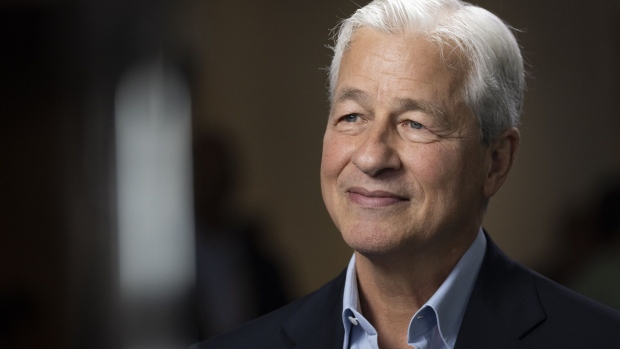Apr 12, 2023
Proxy Season May See More Wall Street Rejection of Climate Proposals
, Bloomberg News

(Bloomberg) --
It’s almost certainly going to be a record-breaking year for shareholder resolutions targeting issues in the world of environmental, social and governance. But whether many of them are adopted is a different matter.
The “E” part of proxy season is set to be particularly hot, accounting for about 30% of all votes, with investors calling for companies to be more transparent both about plans to phase out fossil fuels and add specific near-term targets for lowering emissions.
FedEx Corp., Lockheed Martin Corp. and a bunch of financial firms including JPMorgan Chase & Co., Bank of America Corp. and Goldman Sachs Group Inc. are among the companies in the crosshairs. Zeroing in on them are coalitions including officials representing some of the largest US pension plans, as well as advocacy organizations such as As You Sow and Sierra Club Foundation.
“Growing shareholder pressure means companies are going to have to act whether they like it or not,” said Michael Passoff, chief executive of Proxy Impact and founder of Proxy Preview, which provides shareholder engagement and proxy-voting services.
The number of climate-related resolutions voted on has more than tripled in the past three years, with support for the proposals climbing to almost 40% during the last proxy season from 29% as recently as 2019, Passoff said. Climate votes that received majority backing last year took place at companies including Boeing Co., Caterpillar Inc., Chubb Ltd. and Dollar Tree Inc.
But this year could see retrenchment.
“There are plenty of ESG proposals this year, but the real question will be how much support they get from the biggest asset managers,” said Rob Du Boff, senior ESG strategist at Bloomberg Intelligence. “Some of these firms have already softened their language, indicating they may be less willing to vote for the proposals.”
And companies are pushing back against many of the recommendations. JPMorgan, the largest US bank and one of the biggest financiers of Big Oil, is a good illustration of how a large chunk of corporate America is responding to requests on the environmental front.
The New York City Comptroller, which serves as trustee for the city’s massive pension funds, wants New York-based JPMorgan to set ambitious greenhouse gas reduction goals for 2030, as part of the bank’s focus on longer-term targets.
Specifically, the comptroller is pressing the lender to cut its lending and underwriting to the high-emitting oil, gas and power generation industries. The bank has promised to reach net-zero emissions by 2050 and set a goal to reduce the greenhouse gas “emissions intensity” of the oil, gas and power sectors by 2030.
However, the bank doesn’t yet have a science-based 2030 target to reduce GHG emissions on an absolute basis, according to the comptroller.
“An absolute reduction target aligned with a science-based net-zero emissions pathway is critical for the company to achieve its net-zero commitment and more fully address its climate risks,” the comptroller said, adding that JPMorgan’s GHG reduction plan trails competitors such as Citigroup Inc. and HSBC Holdings Plc.
JPMorgan’s response? Reject the proposal. The bank, led by Chairman and Chief Executive Officer Jamie Dimon, is recommending shareholders vote against it, in part because the company says it intends to share more details this year, including “disclosure of absolute financed emissions in key sectors of our financing portfolio.”
JPMorgan also wants shareholders to oppose a call from the Sierra Club Foundation for the bank to “phase out” lending and underwriting to projects for companies engaging in new fossil-fuel exploration and development. The bank argues that “an abrupt withdrawal from financing new oil and natural gas projects wouldn’t be prudent, as it would increase risks associated with energy security without necessarily optimizing global carbon emissions reduction over the long term.”
JPMorgan also opposes a proposal from As You Sow that asks the bank to issue “a transition plan that describes how it intends to align its financing activities with its 2030 sectoral greenhouse gas emissions reduction targets, including the specific measures and policies necessary to achieve its targets.”
The bank said its climate report already provides shareholders with the appropriate information.
“When banks object to better transition planning, it makes one wonder what it will take for Wall Street to wake up and understand that climate change is an issue that needs to be addressed immediately,” Passoff said.
Read more: BlackRock, RAM Set Proxy Season’s ESG Priorities
Danielle Fugere, president and chief counsel of Berkeley, California-based As You Sow, said “transition planning is new to banks, and there are gaps and holes that need to be filled.” Fugere says she sees “progress on certain issues at certain lenders, but no bank has yet provided a clear transition plan to investors.”
As You Sow is representing shareholders this year on more than 50 resolutions, including about 30 climate-related filings with companies ranging from JPMorgan, Goldman Sachs, Bank of America, Wells Fargo Co., Morgan Stanley and Travelers Cos. to FedEx, Lockheed Martin, Amazon.com Inc., Raytheon Technologies Corp., Southern Co. and Texas Roadhouse Inc.
The fact remains, Fugere says, that “the urgency around climate change is only going to increase, and that means there is going to be more financial pressure on banks, and almost all companies, to address the growing environmental risks.”
©2023 Bloomberg L.P.


